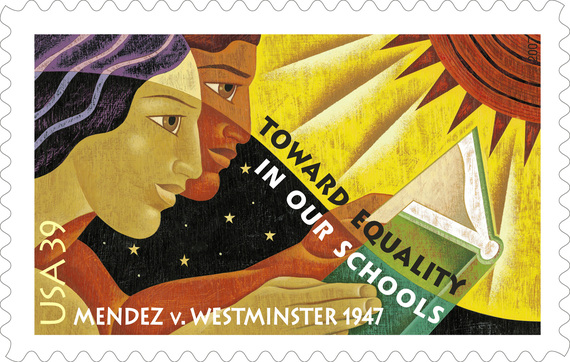As we all celebrate the 60th Anniversary of the historic Brown vs. Board of Education case which changed America going forward, I made a point of asking friends, acquaintances and even some strangers if they were aware of the Mendez vs. Westminster case.
"I'm not familiar with it." "Never heard of it." "Someone actually sued the dog-show people?"
These responses represented the lack of knowledge about the case from educated people, most of who were lawyers, or in education, or worked with communities of color.
What they and every American should know is that seven years prior to Brown v. Board of Education being decided by the Supreme Court, the Mendez family and other others sued Orange County school districts, which were segregating Mexicans from whites in the schools. The 9th U.S. Circuit Court of Appeals ultimately decided to desegregate the schools in those districts and then desegregate the entire state of California, under the leadership of then Governor and future Supreme Court Justice Earl Warren. The case also helped desegregate housing, restaurants, swimming pools and other areas which had been segregated up to that point. Most poignant, the case had an impact on Brown vs. BOE seven years later.
Yet, as I attended a lunch filled with influential leaders commemorating the 60th Anniversary of Brown this afternoon, I noticed the printed program had a section called "The Road to Brown," citing key events leading to the landmark case, Mendez wasn't mentioned.
But Thurgood Marshall's wife and son were very aware of the Mendez case as we chatted at their table during the event as I paid my respects. You see, Thurgood Marshall and the NAACP played an important role in the Mendez case, a point which carries an important message today -- it will take a collective effort to make an impact on our community and country. In addition to the NAACP and LULAC (League of United Latino America Citizens), organizations which contributed to the case included the ACLU, American Jewish Congress and Japanese American Citizens League.
"Mendez was critical to the strategic choices and legal analysis used in arguing Brown and in shaping the ideas of a young NAACP attorney, Thurgood Marshall," wrote Maria Blanco in The Lasting Impact of Mendez v. Westminster in the Struggle for Desegregation. "Moreover, the Mendez case -- which originated with LULAC but benefited from the participation of the NAACP -- also symbolized the important crossover between different ethnic and racial groups who came together to argue in favor of desegregation. From a legal perspective, Mendez v. Westminster was the first case to hold that school segregation itself is unconstitutional and violates the 14th Amendment."
Mendez matters and belongs in the conversation about Brown. It's important we inform the media, influencers, policymakers and children about the magnitude of the Mendez case. I made my children aware when dropping them off at grade school that they wouldn't have been able to be in class with their friends if they looked different. They looked at me the way I looked at someone who told me when I was a child how cavemen lived. They couldn't get their head around it, especially since the only President of the United States they have known since being born is African American and there is a Latina on the Supreme Court. That is a good thing. But we need to spread the word about Mendez.
Orange County's Sandra Robbie is certainly doing her part. As a Latina who didn't know about Mendez when she was interning at a TV station about 12 years ago, she was so inspired by the story that she produced the documentary Mendez vs. Westminster: For All the Children/Para Todos los Ninos, which resulted in an Emmy Award and countless people learning about Mendez through her efforts which include a bus tour throughout the state of California to promote Mendez and even co-authoring a children's book about the case.
But making people aware of Mendez while celebrating Brown won't be enough according to a new study by UCLA's Civil Rights Project. More work needs to be done to fulfill the great vision of the pioneers who dismantled "separate but equal" through Mendez and Brown 67 and 60 years ago respectively. The study found that approximately 50 percent of Hispanic students in California attend schools where more than 90 percent are Latino or African-American, and facing poverty. The study, which is co-authored by Gary Orfield who is also co-director of the Civil Rights Project, states: "This new research affirms that the growth of segregation coincides with the demographic surge in the Latino population. Segregation has been most dramatic for Latino students, particularly in the West, where there was substantial integration in the l960s but segregation has soared since."
Are we celebrating too early? There is obviously a lot of work to be done in continuing the work of great American Heroes like Thurgood Marshall, David Marcus, the courageous families who were part of Mendez and Brown, and the impactful organizations like NAACP and LULAC in making our classrooms a welcoming environment for all students, including immigrant students ...but that's another article.

